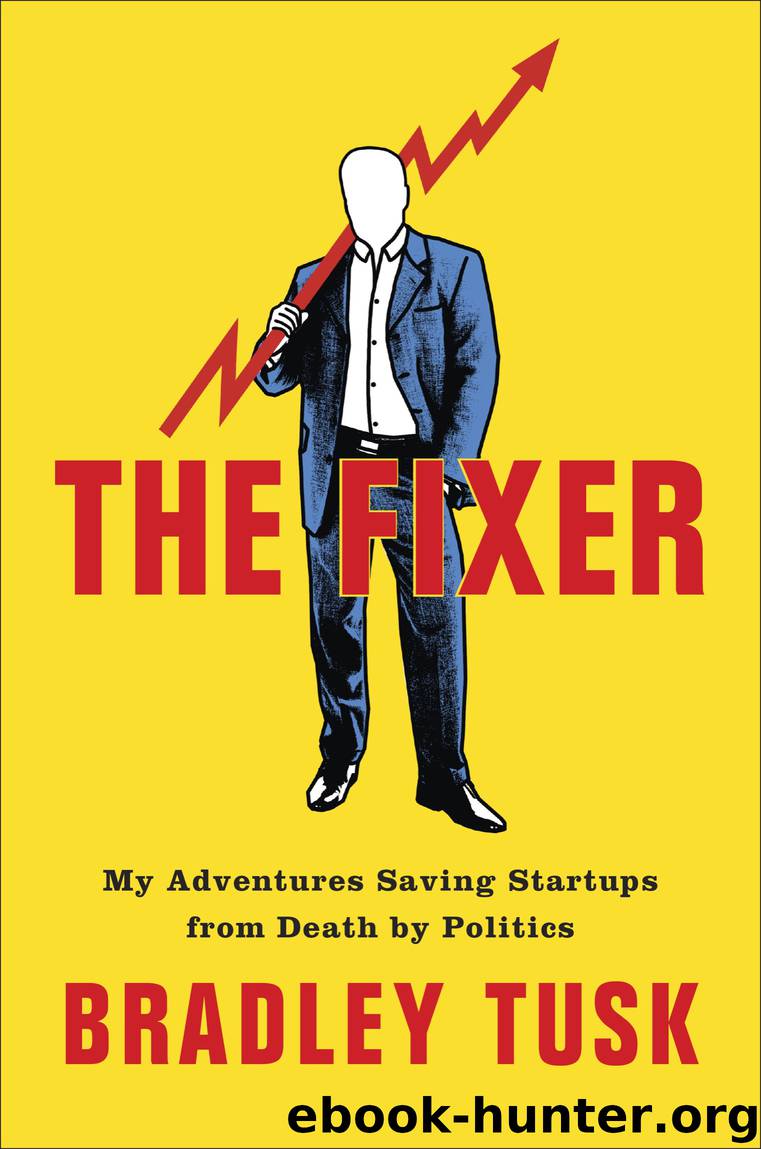The Fixer by Bradley Tusk

Author:Bradley Tusk
Language: eng
Format: epub
Publisher: Penguin Publishing Group
Published: 2018-09-17T16:00:00+00:00
18
Don’t Confuse Ideology with Politics
On August 3, 2015, thanks to my friend and PR genius Stu Loeser, the Times ran a story about how Uber’s political adviser was launching a firm to help startups solve problems in return for equity. It wasn’t long before the phone started ringing, and with Handy, one of our first clients, we learned quickly that this business wasn’t going to be a cakewalk.
Handy is a platform that connects consumers to housekeepers and handymen. The premise is pretty simple: People have paid other people to clean their homes for thousands of years. And yet even today, housekeeping operates mainly in the gray economy. Most of it is off the books. There’s little regulation. Few taxes are paid. There is no systematic way for people to find a good housekeeper or for housekeepers to find work.
And as more and more people kept changing the way they work, being able to offer services on the Handy platform for five or ten hours a week while they’re in college or taking care of an elderly relative or transitioning to a new career made a lot of sense. Oisin Hanrahan founded Handy when he was still in business school at Harvard. He and his cofounder, Umang Dua, built the platform and started recruiting people from both sides of the equation—customers and housekeepers/handymen.
It worked. Handy quickly attracted serious venture funding, raising $50 million from funds like General Catalyst, Revolution, and TPG. They launched in New York and quickly expanded to other cities in the United States like Boston, Chicago, Los Angeles, San Francisco, Denver, Houston, Seattle, and so on, as well as into Canada and the UK. And then the problems started.
Handy’s professionals (the term for cleaners and handymen) are independent contractors. U.S. labor law divides workers into two categories: independent contractors and full-time employees. Full-time employees receive benefits and get Social Security, and their work is their main profession. Independent contractors typically work for a variety of different people part-time, so they’re self-employed. The law has a variety of tests to determine when someone is a full-time employee and when someone is an independent contractor, but it varies by state and is frequently, and deliberately, very vague.
Why would anyone want to make it hard to figure out what the law is and how to comply with it? Yep. Politics.
Imagine you’re a labor union. You hate independent contractors—you can’t organize them, you can’t represent them, and most important, you can’t charge them dues. If the law gives clear, firm guidance to businesses as to what constitutes full-time employment and what constitutes independent contractor status, then everyone has to live by it. Seems fair, right? Not if you want to rig the outcome. Vague laws mean more opportunity for regulators to interpret them however they want.
So if you’re a politically powerful union who donates millions of dollars to political candidates and conducts extensive get-out-the-vote operations on Election Day, vague laws plus political influence mean lots of adjudications against businesses who work with independent contractors.
Download
This site does not store any files on its server. We only index and link to content provided by other sites. Please contact the content providers to delete copyright contents if any and email us, we'll remove relevant links or contents immediately.
The Black Swan by Nassim Nicholas Taleb(7129)
Bad Blood by John Carreyrou(6622)
Pioneering Portfolio Management by David F. Swensen(6301)
Millionaire: The Philanderer, Gambler, and Duelist Who Invented Modern Finance by Janet Gleeson(4478)
Skin in the Game by Nassim Nicholas Taleb(4250)
The Money Culture by Michael Lewis(4207)
Bullshit Jobs by David Graeber(4190)
Skin in the Game: Hidden Asymmetries in Daily Life by Nassim Nicholas Taleb(4007)
The Wisdom of Finance by Mihir Desai(3748)
Blockchain Basics by Daniel Drescher(3583)
Liar's Poker by Michael Lewis(3449)
Fooled by Randomness: The Hidden Role of Chance in Life and in the Markets by Nassim Nicholas Taleb(3124)
Hands-On Machine Learning for Algorithmic Trading by Stefan Jansen(3072)
Mastering Bitcoin: Programming the Open Blockchain by Andreas M. Antonopoulos(3045)
The Intelligent Investor by Benjamin Graham Jason Zweig(3041)
The Power of Broke by Daymond John(2988)
Investing For Dummies by Eric Tyson(2954)
You Are What You Risk by Michele Wucker(2838)
Bull by the Horns: Fighting to Save Main Street From Wall Street and Wall Street From Itself by Sheila Bair(2775)
